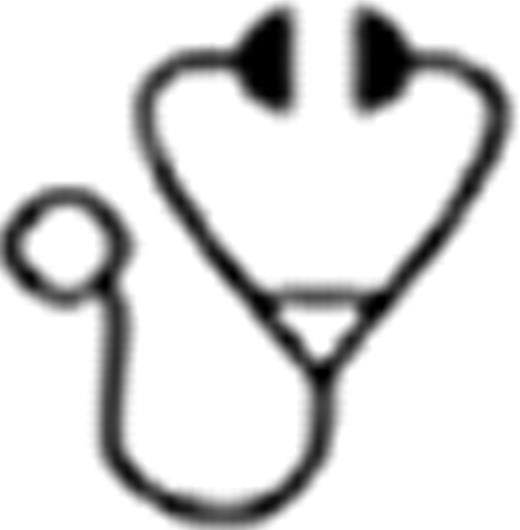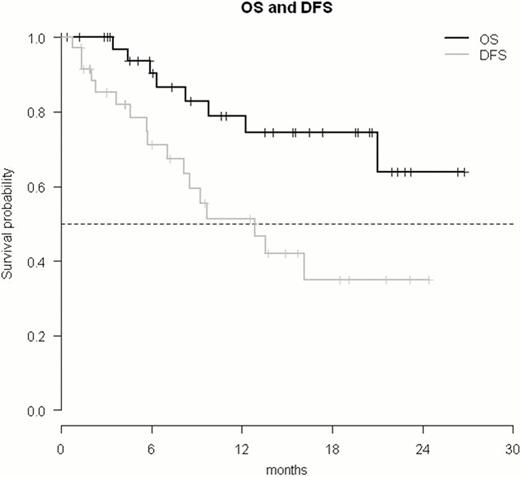Abstract
Tyrosine Kinase Inhibitors (TKI) have been shown to be very effective for the treatment of Acute Lymphoblastic Leukemia (ALL), with a Complete Hematologic Remission (CHR) rate close to 100%, and a high rate of Complete Cytogenetic and Molecular responses (CCgR and CMR). However, when they are used alone, as single agents, most patients relapse, so that they are currently used in combination with chemotherapy and as a preparation to allogeneic stem cell transplantation (SCT). Since Ph+ ALL is more frequent in the elderly, many patients cannot tolerate intensive chemotherapy and are not eligible for SCT. We have explored if the administration of two TKIs, Nilotinib (NIL) and Imatinib (IM) can improve the results without increasing the toxicity.
To evaluate the response and the outcome of Ph+ ALL patients treated with the sequential administration of NIL and IM, to investigate the type and number of BCR-ABL kinase domain mutations developing during and after the study.
We have designed a study (ClinicalTrials.gov. NCT01025505) in which patients more than 60 years old or unfit for intensive chemotherapy and SCT where treated with two TKIs, NIL 400 mg twice daily, and IM 300 mg twice daily, alternating for 6 weeks for a minimum of 24 weeks (study core) and indefinitely in case of response. The 6-weeks rotation schedule was respected, irrespectively of temporary discontinuations. The primary end-point was the rate of Disease Free Survival (DFS) at 24 weeks (4 courses of treatment); the secondary end points included the evaluation of CHR, CCgR and CMR rates. Mutation analysis was performed by nested RT-PCR amplification of the ABL kinase domain of the BCR-ABL transcript (codons 206 through 421). Amplified products were screened by denaturing-high performance liquid chromatography (D-HPLC). Samples scored positive for the presence of sequence variations were then subjected to direct automatic sequencing to characterize the mutation.
39 patients have been enrolled in 15 Italian hematologic Centers (median age 66 years, range 28–84). Among these, 8 patients were unfit for standard chemotherapy or SCT (median age 50 years, range 28–59). 27 patients were p190, 5 were p210 and 7 were p190/p210. After 6 weeks of treatment, 36 patients were evaluable for response: 34 were in CHR (94%) and 2 in PHR (6%). 23 patients have already completed the study core (24 weeks), 87% were in CHR and 17 are currently continuing therapy in the protocol extension phase.
Thus, the OS at 1 year is 79%, and 64% at 2 years. Overall, 1 patient was primarily resistant and 13 patients have relapsed, with a median time to relapse of 7.6 months (range 0.8–16.1 months), for a DFS of 51.3% at 12 months (Figure 1). Mutations detected were T315I in 2 cases, Y253H in 3 cases, T315I and Y253H in 1 case, E255K in 1 case, T315I and E255K in 1 case, E255V and Y253H in 1 case. Two patients were WT.
A detailed kinetics of Molecular responses is shown in Table 1. Data on mutational analysis are reported in Table 2. Further details about Cytogenetic and Molecular responses, and about Adverse Events will be provided on site.
In this small cohort of Ph+ ALL elderly/unfit patients, the rates of relapse and progression were not likely to be different from the rates observed with Imatinib alone (Vignetti et al, Blood 2007, May 1;109(9):3676-8) and Dasatinib alone (Foà, Blood 2011, Dec 15;118(25):6521-8).
It's important to notice that the mutations that occurred at the time of relapse were sensitive to other TKIs (Dasatinib and Ponatinib).
COFIN, Bologna University, BolognAIL, PRIN, Fondazione del Monte di Bologna e Ravenna, INPDAP.
Kinetics of Molecular response
| . | n . | Undetectable (<0.0001) . | Total Detectable . | BCR-ABL <0.001 . | BCR-ABL >0.1 . |
|---|---|---|---|---|---|
| baseline | 36 | 0 | 0 | 0 | 36 |
| week 6 | 31 | 3 | 7 | 8 | 13 |
| week 12 | 30 | 2 | 9 | 12 | 7 |
| week 18 | 22 | 2 | 8 | 8 | 4 |
| week 24 | 18 | 2 | 7 | 7 | 2 |
| . | n . | Undetectable (<0.0001) . | Total Detectable . | BCR-ABL <0.001 . | BCR-ABL >0.1 . |
|---|---|---|---|---|---|
| baseline | 36 | 0 | 0 | 0 | 36 |
| week 6 | 31 | 3 | 7 | 8 | 13 |
| week 12 | 30 | 2 | 9 | 12 | 7 |
| week 18 | 22 | 2 | 8 | 8 | 4 |
| week 24 | 18 | 2 | 7 | 7 | 2 |
Mutational analysis was performed in 11/14 patients who failed
| Pts . | Mutation . | Time to relapse (months) . |
|---|---|---|
| 006001 | y253h, e255v | 5.5 |
| 006012 | t315i, y253h | 20.1 |
| 006018 | e255k, t315i | 3 |
| 006020 | y253h | 8.8 |
| 006026 | e255k | 7.3 |
| 008007 | t315i | 2.5 |
| 008015 | y253h | 14.5 |
| 012035 | wt | 3.8 |
| 042004 | wt | 10.1 |
| 043009 | y253h | 17.4 |
| 043030 | t315i | 7.3 |
| Pts . | Mutation . | Time to relapse (months) . |
|---|---|---|
| 006001 | y253h, e255v | 5.5 |
| 006012 | t315i, y253h | 20.1 |
| 006018 | e255k, t315i | 3 |
| 006020 | y253h | 8.8 |
| 006026 | e255k | 7.3 |
| 008007 | t315i | 2.5 |
| 008015 | y253h | 14.5 |
| 012035 | wt | 3.8 |
| 042004 | wt | 10.1 |
| 043009 | y253h | 17.4 |
| 043030 | t315i | 7.3 |
Pizzolo:Hoffmann-La Roche: Consultancy, Honoraria. Luppi:CELGENE CORPORATION: Research Funding. Vallisa:CELGENE CORPORATION: Research Funding. Martinelli:NOVARTIS: Consultancy, Honoraria, Speakers Bureau; BMS: Consultancy, Honoraria, Speakers Bureau; PFIZER: Consultancy; ARIAD: Consultancy. Baccarani:ARIAD, Novartis, Bristol Myers-Squibb, and Pfizer: Consultancy, Honoraria, Speakers Bureau.

This icon denotes a clinically relevant abstract
Author notes
Asterisk with author names denotes non-ASH members.


